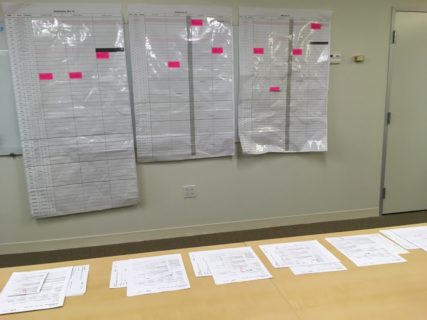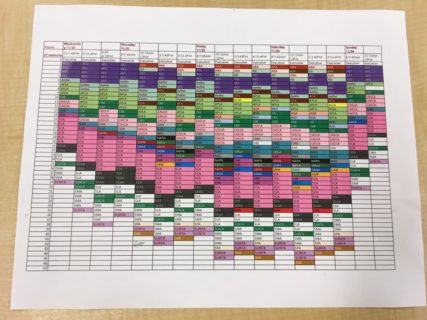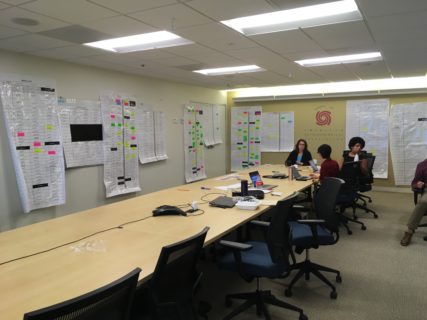Article begins
Not sure why your 2019 AAA/CASCA Annual Meeting session is scheduled for a particular date or time? An executive program co-chair shares their experience.
For many years, I wondered how the AAA Annual Meeting was scheduled—how was my panel assigned a day and time, and why was my paper accepted as a poster, or not at all? For the past year, I’ve worked with AAA, CASCA, and the executive program chairs from 2018–2020 to set the conference schedule. I have learned a lot about the rituals and structures that affect that process (and as an applied anthropologist, I also tried to improve the process in 2019).
The schedule ultimately depends on the following two things:
- The scores given to each paper by the section program chairs. These are divided into relative ranks within the section; those at the top (for example, Invited Sessions) are guaranteed placement in the Annual Meeting program, and others are ranked A (the top 50 percent of panels), B, or C (see the AAA website for more details about this peer review process).
- The annual scheduling meeting, at which the executive program chairs use the rankings to fill the schedule.
These two came together in the following way in 2018–2019.
In June 2018, I walked into the conference room in the AAA office and was immediately overwhelmed by the volume of paper. We found 45 piles of paper, some 50–60 pages high, awaiting us on the conference table, which was ringed by five large grids papering the walls. Each piece of paper represented a panel, and each pile was a section’s accepted panels; our job was to put the stickers that matched each piece of paper on the gridded sheets on the wall to create the schedule for the 2018 AAA Annual Meeting. There were 17 total time slots, with 45 rooms for each, yielding 765 sessions (excluding 2 time slots blocked off for AAA Special Event setup and 6 Late-Breaking Session spots). We had 12 hours over two days to complete the schedule with assistance from AAA staff who entered the assigned dates and times of panels, and checked for participant time conflicts using the scheduling software.

The start of the scheduling process in 2018 showing some days and section piles.
By the end of the first day, my brain was mush. We had tried to make sure each section had a panel or more at a “prime” time, and that panels with similar themes (within and across sections) were scheduled at different times. When we worked with the Invited and Co-Sponsored Sessions (our first task), this was easy—the 17 pink-stickered Executive Sessions had been put on the grids first, and then we could balance these topics with the information for Invited and Co-Sponsored Sessions. But then we started on the sessions ranked “A” by the AAA sections. Some sections had five or fewer of these, so they could be scattered across the days and times, but larger sections had 40 or more “A” sessions.
We tried to make sure the “A” sessions did not conflict with other sessions from the same section or with similarly themed sessions. We filled in the Friday and Saturday slots first, knowing our colleagues preferred these dates. The highly ranked “A” sessions got these days and times, and we filled in other days and times as we hit conflicts with section sessions and thematic similarities as well as with participants in multiple sessions. As the grids filled it became harder and harder to minimize conflicts. Room sizes and requests from organizers added to the complexity of scheduling. The process quickly went from systematic and intentional to the organized chaos of arranging a multitude of sessions and themes by hand. If you want to see what this looked like, AAA staff captured a time-lapse video of the two days in 2018.
I knew there had to be a better way to schedule the Annual Meeting. From the 2018 experience, I knew there were four basic constraints: honoring section rankings, minimizing overlap of section panels, scheduling thematically similar panels at different times, and avoiding participant double-booking. As someone with governance experience in smaller sections, I also knew that making sure small sections’ panels weren’t at the same time was important. The scheduling software only took care of the double-booking concerns. In 2019, we also wanted to set aside Saturday for public-facing panels and events, which added another constraint. While I was unable to tempt a computer scientist to write an algorithm to solve for all of these issues at once, I put the 2018 and 2019 data into Excel to draft a schedule that would minimize the section overlap and give us more time to be intentional about similar themes, including our Saturday plans.
My first draft took the number of sessions for each section in 2018 and spread them out across the 17 time slots for 2019, with the 43 rooms we would have in Vancouver. If a section had less than 18 panels, they would have one session per time per day, to prevent splitting the audience across multiple sessions. With this initial draft, we could assign a number of sessions per section per time slot, depending on the number of accepted panels.

A first draft of the schedule for 2019 with panels arranged by section and time.
With this in place, we could be more intentional about where we would place similar topics, so there would be less overlap across sessions at the same time. Once we had a few sessions on migration (a popular topic for 2019) we would not put any others at the same time. Partway into our efforts, we found that if one person arranged each time slot we could really do this efficiently, because we could remember what we’d scheduled at that time already. Roundtables were also given dedicated rooms for microphones. We placed more public-oriented panels on Saturday, despite similarities in topics of migration, indigeneity, climate change, and health.
At the end of day two I wished I’d brought my sneakers for all the running between the piles of panels and grids. I’m profoundly grateful for the team that was willing to try my new system, and remained upbeat, friendly, and hard-working through the scheduling process: my co-chair from CASCA, Pam Downe; next year’s co-chair, Bianca Williams; and the AAA’s Alana Mallory (assistant director, meetings and conferences), Nate Wambold (director, meetings and conferences), and Nell Koneczny (accessibility and meetings coordinator).

The end of the second day of the 2019 scheduling meeting.
None of this is a perfect process, and we always have more excellent panels than we can schedule. This year, my own co-authored submission was accepted as a poster. I encourage you to swing by the Individual Galleries (posters) to visit these powerful intellectual contributions and engage in robust conversations about data, interpretation, and representation with their presenters.
We’re looking forward to the 2019 AAA/CASCA Annual Meeting in November, and hope that you will come ready to explore the pressing issues currently facing our discipline and our world. We believe many of our collective discussions will demonstrate how a focus on change can be a positive force for groundbreaking anthropological research, new forms of cultural understanding, scientific awareness, and global empathy. In 2019, there are many important challenges that anthropology is best suited to address, and this meeting is a moment to make that point loud and clear.
Nicole Peterson is associate professor and director of graduate studies in the Department of Anthropology at the University of North Carolina at Charlotte. She is executive program co-chair for the 2019 AAA/CASCA Annual Meeting.
For more information visit the AAA Annual Meeting page on the AAA website.
Contact the AAA Meetings Department at [email protected].
Contact Executive Program Co-Chairs Martha Radice (CASCA), Nicole Peterson (AAA), and Pamela Downe (CASCA) at [email protected].
Cite as: Peterson, Nicole. 2019. “Why Is My Panel on Thursday Morning?” Anthropology News website, September 12, 2019. DOI: 10.1111/AN.1257

